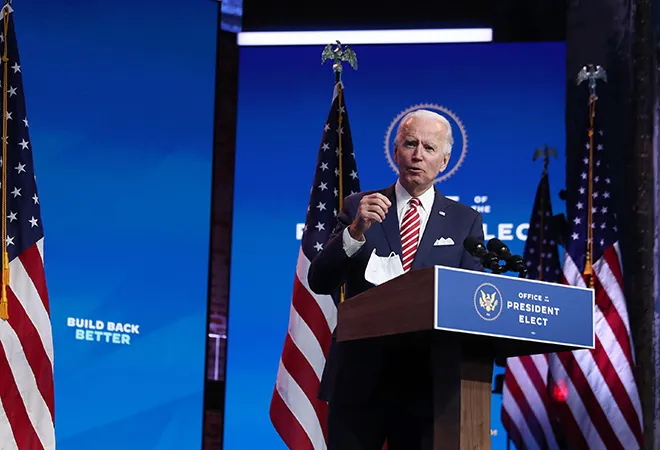The presidential election of the United States of America has been won by Joe Biden. There have been celebrations in the US and in other parts of the world. Donald Trump’s presidency is widely viewed as a highly disruptive one, making him a rather unpopular figure globally. But in the US his popularity does not seem to have declined, even though he could not muster enough electoral college votes. Since he refuses to concede, words like ‘coup’ are being bandied about. It is highly unusual to hear such words in the context of the American democracy, but the extreme polarization of the body politic has brought to the fore the infirmities of its political system at a time when it was least desired.
We were being told that there would be a Democratic wave on November 3. Instead, the performance of the Democrats has been below par. Not only is the US Senate likely to remain under Republican control, but the Democrats also lost seats in the House of Representatives. Democrats did not pick up a single state legislative chamber, and their majority in the House of Representatives has narrowed, sparking calls for a change in leadership. This success will give Republicans substantial control over congressional redistricting as states redraw electoral maps for congressional and state legislative districts next year, putting Democrats on a weak wicket in the long term.
Even Biden has managed to scrape through to the presidency by winning with slim margins in the key battleground states. It is this fractured mandate that Trump is seeking to exploit further by throwing in multiple legal challenges in the way of Biden. While the Trump versus Biden saga will continue to attract a lot of attention, what is equally, if not more, interesting is the intra-Democratic Party turmoil that this mandate has begun to produce. The moderate and centrist Democrats are worried that the so-called ‘progressives’ tried to provide an agenda for the party which was viewed as out of the mainstream, making it difficult for the Democrats to win seats in the hinterland. Several centrist Democrats have complained about calls by their colleagues on the left of the party to defund the police and law enforcement. As one moderate Democrat, Abigail Spanberger, said, “We lost races we shouldn’t have lost... ‘Defund the police’ almost cost me my race because of an attack ad... Don’t say socialism ever again... We need to get back to basics.”
This has resulted in a strong pushback from the progressives. The Michigan representative, Rashida Tlaib, part of a liberal congressional clique known as “the Squad”, targeted the centrist Democrats for blaming the far-left for hurting the party. She, along with other progressives, has warned, “If we abandon our core progressive base and agenda, Democrats will not hold onto the House majority in the 2022 midterms and will have no hope of gaining grounds in the Senate.”
This group remains concerned about the prospect of President Joe Biden engaging with moderate Republicans as he tries to play the role of a unifier. Tlaib has made it clear, “We are not interested in unity that asks people to sacrifice their freedom and their rights any longer.” The senator, Bernie Sanders, is an important player in this dynamic. Sanders, who caucuses with Senate Democrats, has been floated by the progressives as a potential candidate for the labour secretary position in the incoming Biden-Harris administration and he has suggested that he would introduce a 100-day agenda of his own.
As Biden tries to make his way to consolidating his governance agenda, he will find that the challenges within his own party might be far more difficult to tackle than he would have imagined. The fault lines within the US and the Democratic Party are likely to ensure that governance will not be easy. This will be the single-most important issue facing the Biden administration at a time when the allure of the American democracy is already being questioned in parts of the world.
This commentary originally appeared in The Telegraph
The views expressed above belong to the author(s). ORF research and analyses now available on Telegram! Click here to access our curated content — blogs, longforms and interviews.




 PREV
PREV


